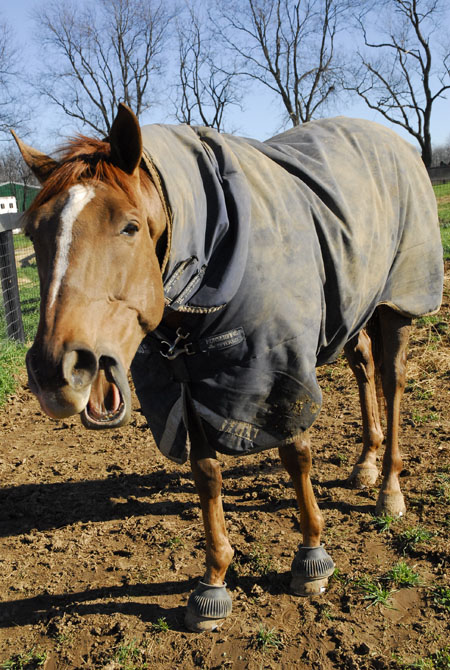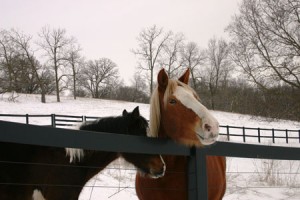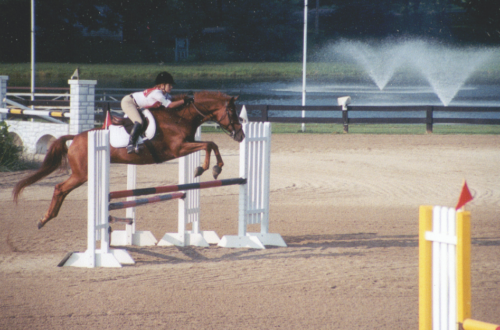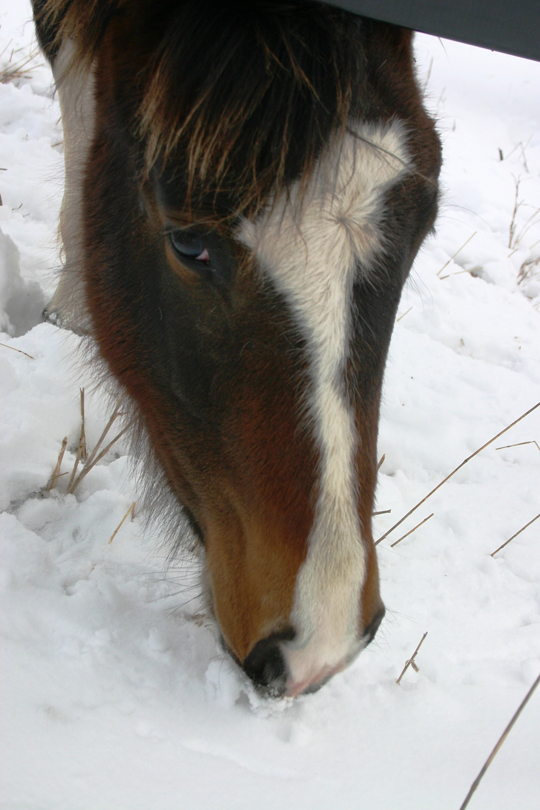
Winter Horse Care Part 2
Today we are sharing part two of a two-part blog about winter horse care from equine veterinarian and RS of the Lake Shore Region, Dr. Rae Birr, DVM. It’s cold out there this time of year. To take the best possible care of your horses, we will discuss winter preparation, thinking points to consider for horse care in the cold, plus a few tips submitted to us by friends on Facebook.
Preparation for Winter
Be sure you have a way to easily get fresh water to your horse once the temperatures drop. Do you have a water hydrant or faucet in your barn? It might need a heat source to keep it from freezing. Of course, all the safety precautions for electricity in the barn need to be met but a heat tape on your exposed water line may be helpful. A water tank heater may be needed to keep your water unfrozen. Ask questions and be careful in your purchase to get one that will be most efficient and work in your tank. A heater that is too big will waste electricity and a heater that is too small will be overworked and may fail. Be sure your wiring will support your heater. These devices draw a lot of power. A way to run your tank heater more efficiently is to plug it into a rheostat. This regulates how long the heater stays on. Most tank heaters run constantly to keep the water at a certain temperature (usually around 45 degrees). The rheostat will cycle the heater off and on while the water stays warm enough to not freeze. There are water tank heaters that are coupled with a water bubbler or aerator. It takes longer for moving water to freeze and the bubblers can keep the water unfrozen while using less heat and, therefore, less electricity, making them more economical.
Insulating around your water tank is always a savings on heating. Hays flakes, straw bales, styrofoam blocks/sheets/peanuts, even fiberglass can be used for insulation but be sure the horses are separated from the insulating material so they cannot disturb it or eat it. Building a box to set your tank in is often useful. Fashioning a cover for the box is useful too. Remember the air is drier so water evaporates faster and the water is warmer than the air, which will enhance evaporation too. A cover on your tank, leaving a place for the horses to access the water, will help keep more water in the tank than in the air.
On a smaller scale, all these water tank ideas are useful for buckets, heated buckets or automatic waterers in the winter. Consult the manufacturer of any automatic waterer or heated bucket before using a rheostat or heat tapes.
It is always best to buy and install what you will need for winter before the pipes freeze!
In addition to watering needs in the winter, your horse should have a good exam to determine his Body Condition and his dental condition in the fall. We want our horses to have enough body fat to help insulate them and maintain their body temperature when it is cold. Very thin horses have no fat reserves to use to help them stay warm. The condition of his teeth is significant all year but especially in the winter when he is sometimes asked to chew and digest coarser, drier feed. If he cannot breakdown the feed into easily swallowed and digested particles then he runs the risk of choking or getting an impaction colic, as well as not getting the most nutrients out of the feed. Having good dental care makes him much more able to withstand the stresses of winter.
Parasite control is another pre-winter duty for a horseowner. Consult with your veterinarian on the best deworming and parasite management plan for your location and your horse. External parasites like lice and ringworm are more common in the winter months and doing your daily grooming will help you notice any evidence of a problem.
Winter feeding requires some adjustments. While your horse may not be working as hard as he does in the summer months, his body is working at producing energy to stay warm. This energy comes from digestion of good quality feed. Sometimes horses need more to eat in the winter. The less active months are not the time to use lower quality feeds. Winter is hard work for the horse’s body, just like training and competition, and we should not skimp on their needs in the winter.
Wintertime Thinking Points
Does your horse get some sort of joint supplement during the heavy competition months? Do you think that he doesn’t need the supplement when you are not riding as often or not doing as much training or competing? Think about this: The less active months are when his body can heal and replenish the body parts that have worked hard for you. Supplements provide the building blocks for strengthening and repairing their bodies. Perhaps the winter months are the MOST important time to give good quality joint supplements to our hard working partners.
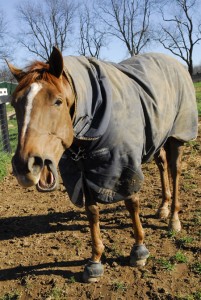 Do you need to clip your horse? Why do we clip the protective winter hair off our horses? Sometimes it’s necessary to treat a wound or perform a surgery but mostly we clip to make it easier for us. They are easier to clean, they sweat less, they cool out more quickly. Does your horse work hard all winter? Or does he just get ridden every once in a while? Clipping and blanketing are not a necessity of horse care in the winter but may be needed.
Do you need to clip your horse? Why do we clip the protective winter hair off our horses? Sometimes it’s necessary to treat a wound or perform a surgery but mostly we clip to make it easier for us. They are easier to clean, they sweat less, they cool out more quickly. Does your horse work hard all winter? Or does he just get ridden every once in a while? Clipping and blanketing are not a necessity of horse care in the winter but may be needed.
Do you blanket your horse in the winter? Healthy, unclipped horses do not need to wear blankets in the winter. There are horses that live where the winter temperatures do not rise above 0 F for months and these horses do not wear blankets or even stay in stalls. They don’t go off to competitions or get ridden daily but they are able to stay warm and healthy just by growing an insulating coat and eating enough food. Blankets will help with ease of coat care and make the coat a little less dense for cooling out. Think about this: Blankets are not a perfect solution to winter horse care. A blanketed horse needs more frequent scrutiny than a horse without covering. These sturdily built pieces of horse clothing can cause some very scary accidents when they slip or catch on stall or fence or pasture hardware. Horses can hurt themselves badly in even the best fitting blanket. So think about why you need a blanket on your horse.
When is it too cold to ride? Research has discovered that horses that are exposed to temperatures below 15 degree F for prolonged periods of time are more prone to respiratory disease. It appears that around 15 degrees F our horses suffer some damage to their airways so it stands to reason that asking them to work and breath harder at this temperature or below is harder on their respiratory system. This is not to say that 15 degrees is an absolute cut-off for riding. Many of us have had the most fun rides of our lives bundled up on a happy, fuzzy pony in the freezing cold as we see the snow covered trails or the deep drifts in the back pasture! Just remember that if the cold air hurts your nose or throat to breath, it hurts your horse too.
Is it too cold to trailer your horse? Wintertime horse transportation has its own list of precautions. The biggest points to remember are: closing up the trailer to keep it warmer will result in condensation (all the water vapor when they breathe) and they will get wet. They are breathing stale air in a closed up trailer and they can be more susceptible to illness. They cannot move around to warm up; they will get cold. If the trailer vents or windows are open, the horse can be dealing with a significant amount of wind chill inside the trailer. An open side trailer will expose them to frigid air that can damage skin and eyes. Think before you load up and go in the winter.
Hoof care in the winter: good farrier care is important in the winter to help with snow build up in their feet. There are horse shoes and pads that help with this build up. Horses can injure themselves by twisting and torqueing on their joints as they teeter on their mounds of snow. Nothing works perfectly to keep this snow accumulation from happening but a well-trimmed hoof is a good start and a coating of Vaseline or carefully applied non-stick cooking spray (be careful the first time you hold his foot up and spray him with Pam!) on the sole and frog can help the snowballs to pop out.
Tack care: Freezing and thawing cycles are hard on all sorts of materials and leather is not an exception. A regular thorough safety check on your tack is a good idea in the winter with special attention to cleaning and conditioning your leather and monitoring your synthetic tack items.
This article is intended to help you think about your equine partner in the winter months. Whether you are the one who carries the water out from the house every day or you board where someone else takes care of all the details, put some thought into your horse’s care and well-being in the winter.
And a Few Tips from Facebook
Submitted by Katie Stevens– Label your blankets with dog tags for easy identification. I have a different color tag for light, medium and heavy, and each has the individual horse’s name on it
Submitted by Alison Leigh– A few cheap pairs of fly fishing gloves. Easy to clean, keep a dry pair warming in your pocket, water resistant, and the finger tips flip back for fastening buckles or answering your phone
Our blog article comes to us today from USPC Advisory Board Member and Veterinarian, Rae A Birr, DVM. Rae graduated from Pony Club as a B in 1978 and graduated from Michigan State University as a Veterinarian in 1984. Her practice career has always included horses, particularly equine medicine, reproduction and conditioning. She feels strongly about educating the horse owning public so we can be even better caregivers of our equine partners.
